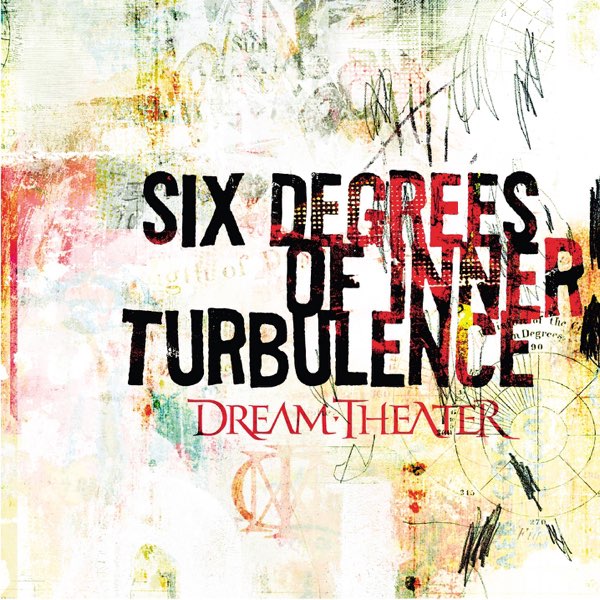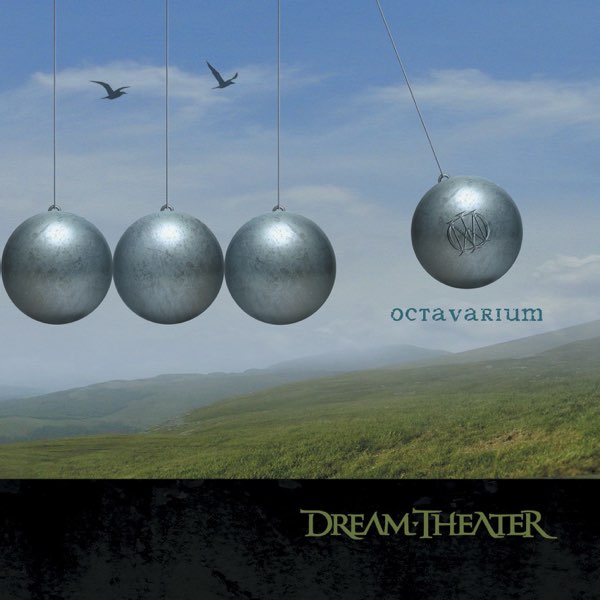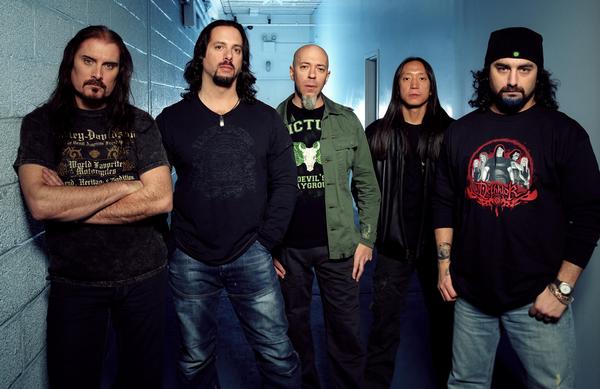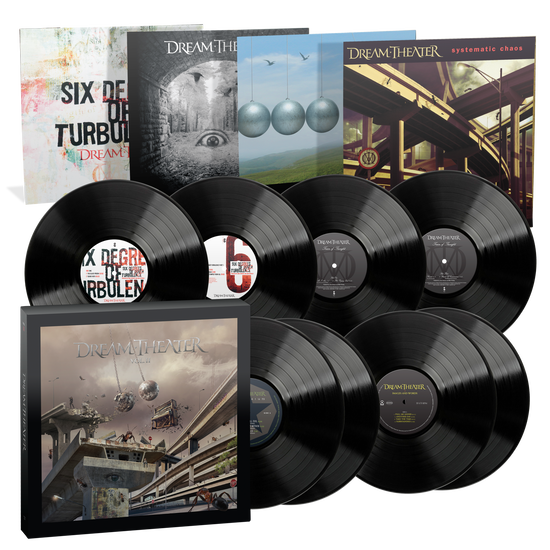Dream Theater Shapeshifts Thematically on “Vol. 2”
The second batch of reissues from the group’s long-out-of-print catalog
‘The tide is turning… everything’s gonna be alright now’ - “New Millennium”. Progressive music is rarely the most commercially viable genre for the singles charts and radio. As the 1990s gave way to the 2000s, Dream Theater avoided becoming collateral damage catering to record label demands. The pressure to write shorter material and work with outside producers/writers—the antithesis of what the band had set out to accomplish—almost to it disbanding. Earning artistic independence and playing by their own rules ultimately insured Dream Theater’s career sustainability. For Dream Theater, understanding and providing what their fans wanted musically always took precedence over being forced by the label or others to become something it was never destined or desired to be.
Dream Theater’s then-scarcely-available back catalog has been making a welcome return to vinyl with reissues of their 1990s output via the Vol. 1 box set and individual releases on clear vinyl pressings. Vol. 2 picks up where the previous box set left off, focusing on the five years, from 2002 to 2007, during which Dream Theater’s album-to-album work ethic was unpredictable and fresh.
The Packaging
Vol. 2 features a new illustration by longtime collaborator Hugh Syme against a spot-varnished matte hardbound slipcase. Its muted tones and realistic look bear a striking resemblance to the cover of Rush’s The Albums 2002-2012 box set, also designed by Syme. References from each of the albums included in the set appear in the form of childish graffiti (Six Degrees of Inner Turbulence), an eyeball projection (Train of Thought), Newton’s cradle (Octavarium), and highways infiltrated by ants (Systematic Chaos).
Aside from Systematic Chaos, most of the albums in this set weren’t available on vinyl upon their initial release, so the packaging here is recycled from both Music on Vinyl and domestic 2010 reissues. This repeats what was done on the Vol. 1 box set, which got high marks for reformatting the inserts into gatefolds, whereas the MOV pressings were single-pocket jackets; why Train of Thought comes in a single sleeve with an insert is somewhat baffling. Housed in polylined sleeves and free of any visible marks, Optimal in Germany did a fantastic job pressing this release on standard-weight vinyl.
The Music & Sound
Rather than recycling the metal parts from past Music On Vinyl pressings as per Vol. 1, or other reissues/originals, each album here was re-cut by Sterling Sound's Ryan K. Smith.
Six Degrees of Inner Turbulence

Produced by John Petrucci and Mike Portnoy
Engineered by Doug Oberkircher and J.P. Sheganowski
Mixed by Kevin Shirley and Claudius Mittendorfer
Mastered by George Marino and Eugene “UE” Nastasi (Sterling Sound)
Lacquers cut by Ryan K. Smith (Sterling Sound)
Music

Sound

As if the conceptual Scenes from a Memory was a triumphant undertaking, Six Degrees of Inner Turbulence, released in 2002, would rewrite the book of progressive metal’s skyrocketing scale. It's one of Dream Theater’s most lyrically ambitious albums, tackling religious themes on “Blind Faith,” the divided opinion of medical science on “The Great Debate,” and mortality on “Disappear.” Mike Portnoy’s journey through Alcoholics Anonymous was the catalyst for “The Glass Prison,” the first entry in a series of songs spawned over multiple albums known as the ‘twelve-step saga.’ The title track is an album within an album, a 42-minute suite divided into eight separate movements, centered on various mental illnesses. Musically, Dream Theater embodies its classic sound and doesn’t stray from experimental approaches on the metaphysically inspired “Misunderstood.” Recording a double album (in CD terms) was something Dream Theater wanted to accomplish since 1992’s Images and Words, and it took ten years to bring the idea to its fullest realization.
Six Degrees of Inner Turbulence is a musically rich album, yet it's sonically uneven. Whether it's specific EQ or how the late George Marino mastered the original album, there’s far too much focus on the mids. Frequent moments where Mike Portnoy’s kick drum is going at a frantic pace kill off everything else in the mix. Instances where James LaBrie’s vocals, along with Portnoy’s background vocals, trade off with each other provide great character and contrast, specifically the call and response sections on “The Glass Prison” or the hallucinating falsettos during “The Test That Stumped Them All.” When the aggression is toned down, this pressing shines. John Petrucci’s doubled acoustics, panned in each channel, on “Solitary Shell,” twinkle and shine. The reverb applied to Labrie’s vocals on “Misunderstood” and “Disappear” lends some airiness. Despite the ebb and flow of sound quality, the symphonic bombast of “Losing Time/Grand Finale” wraps the album up in a bold, majestic fashion.
Train of Thought

Produced by John Petrucci and Mike Portnoy
Engineered by Doug Oberkircher, Kieran Paradias, Brian Harding, and Yohei Goto
Mixed by Kevin Shirley and Dan Bucchi
Mastered by Howie Weinberg and Roger Lian (Masterdisk)
Lacquers cut by Ryan K. Smith (Sterling Sound)
Music

Sound

All progressive subgenres trace the lineage back to archetypal groups like Yes, Genesis, and Pink Floyd. When it comes to progressive metal, its edge ties together the riffage of Metallica and the soaring higher registers of Iron Maiden. Dream Theater tapped more into the darker aspect of their sound on 2003’s Train of Thought. Written in a period of three weeks, the album is driven by dense riffs, dark imagery, and raw intensity. “As I Am” and “Honor Thy Father” are full of venom, channeling personal resilience and bitterness against some of John Petrucci’s gnarliest guitar riffs. Moments like the intimate balladry during the verses of “Endless Sacrifice” and the stark “Vacant” still manage to create moody soundscapes that fit within the album’s trajectory. There’s never a moment Dream Theater ceases to flaunt their virtuoso prowess unaccompanied by vocals on the instrumental “Stream of Consciousness.” Train of Thought remains a fan favorite and is arguably the group’s heaviest record to date.
From the moment John Myung’s bass rumbles during the introduction of “As I Am,” this pressing lives up to its balls-to-the-walls objective. Though Mike Portnoy’s drums sound a little restrained, it leaves room for John Petrucci’s guitars to be where they belong: up front and center. A signature facet of Petrucci’s sound on this album is how his close-mic’d amplifiers allow some clean strumming to bleed through, which contributes a subtle texture to the forceful nature of his playing. The entire group packs the power on tracks like “Honor Thy Father” and “In The Name of God” with well-defined drums, rounded bass, and crunching guitars; the latter suffers from inner groove distortion during the boisterous finale. Another minor gripe is the lack of transitional impact from the calm verses to the huge choruses on “Endless Sacrifice.” Metal albums are hard to translate onto vinyl due to brash dynamics. Train of Thought delivers the thunder many will come to expect.
Octavarium

Produced by John Petrucci and Mike Portnoy
Engineered by Doug Oberkircher, Colleen Culhane, Karoi Kinoshita, and Ryan Simms
Mixed by Michael H. Brauer, Keith Gary, and Will Hensley
Mastered by George Marino (Sterling Sound)
Lacquers cut by Ryan K. Smith (Sterling Sound)
Music

Sound

Octavarium coincided fittingly with Dream Theater’s 20th anniversary in 2005. There was a conscious effort to focus on concise songwriting structures, which became an ironic challenge given how it was easier to write longer pieces than shorter ones. Tracks like “The Answer Lies Within” and “I Walk Beside You” have digestible accessibility, the latter channeling the group’s U2 and Coldplay influence. The metallic nature of Dream Theater’s craft comes hot and heavy on “Panic Attack,” a firm favorite amongst Genzers for its inclusion in the video game Rock Band 2. Octavarium’s closing title track is a dynamic 20+ minute epic that's quintessentially progressive in its arrangement, featuring an orchestra and revisiting all the themes each track explores as a cycle. This also follows the album’s thematic concept, centered on the idea of an octave and the album’s eight songs. Each track exists within a given natural, and the accidentals act as mere segues; music theorists can have a field day with this album! Octavarium’s variety in influence is diverse, bringing together all the possible elements to make what Dream Theater described at the time as ‘a classic album.’
This is by far the best-sounding album in this box set. It’s a refresher to hear heavy tracks like “These Walls” and “Never Enough,” where the harmonically rich beefiness of John Petrucci’s guitar work shines, and no other mix components drown it out. The bottom end of John Myung’s bass manages to shapeshift from having a percussive pluck on “Panic Attack” to offering a lead-like quality during the “Medicate (Awakening)” section of the title track. How James LaBrie’s vocals sound direct, coupled with warm acoustics and an uplifting orchestral arrangement, makes “The Answer Lies Within” a wonderful highlight. There’s also plenty of interchanging atmospheric moments, particularly the way Mike Portnoy’s ominous drum fill crescendos into the explosive opening of “The Root of All Evil” and Jordan Rudess’ Continuum and lap steel guitar building the ethereal landscape of the title track. Octavarim’s moments of booming heaviness and delicate lightness allow the entire band to mesh wonderfully.
Systematic Chaos

Produced by John Petrucci and Mike Portnoy
Engineered by Paul Northield and Chad Lupo
Mixed by Paul Northield
Mastered by Vlado Meller (Sony Music Studios)
Lacquers cut by Ryan K. Smith (Sterling Sound)
Music

Sound

After spending most of the 2000s crafting albums centered on themes, Dream Theater had a palette cleanser on Systematic Chaos, released in 2007. There was only one stipulation: it had to be, according to Portnoy, ‘cutting, aggressive, modern.’ Perhaps this was due to the album being the group’s first for Roadrunner after being with Atlantic subsidiaries for the better part of 15 years. “In The Presence of Enemies” shakes the 20-minute epic cycle by bookending the album, exploring the common narrative of the battle between good and evil forces. The thrashing “Constant Motion” and the gothic “Forsaken” have immense commercial appeal, breaking Dream Theater’s streak of having a collective disdain for music videos; these two were their first in ten years. “The Dark Eternal Night” and its horrific lyrics and chugging riffs might be the single heaviest track in their canon. A candidate for one of their most cutting-edge tracks is the politically-charged and Muse-sounding “Prophets of War.” Systematic Chaos has a divided ‘love it or hate it’ stance amongst Dream Theater fans, and is one of their most underrated efforts.
Whereas Octavarium focused on the tonalities of each mix component, this pressing of Systematic Chaos portrays Dream Theater in a cinematic fashion. The way Mike Portnoy’s drums reverberate the nuances of the room establishes a lively soundstage. Jordan Rudess’ keyboards offer unique textures and intricate leads. However, the snarl on the big introductory chord of “In The Presence of Enemies Pt. 1” and how the strings carry out “Forsaken” and “The Ministry of Lost Souls” is incredibly three-dimensional. John Petrucci’s guitars on “The Dark Eternal Night” have a menacing growl, which complements James LaBrie’s fuzzed-out vocals. Listeners won’t resist the urge to bob their heads during the song’s low and slow outro, propelled by Rudess’ wicked Continuum solo. Systematic Chao’s moment of serenity is “Repentance.” Guitars soaked in vibrato ripple through the speakers, weaved together with washes of Mellotron and transparent harmonies. The only mistake Ryan K. Smith, one of today’s giants in the world of vinyl mastering, made on this pressing was not applying an appropriate fade to the outro of “The Ministry of Lost Souls” and the intro of “In The Presence of Enemies Pt. 2” since the two respectively end and start abruptly. Otherwise, this pressing ROCKS!
Conclusion
The classic lineup of Petrucci/Portnoy/Myung/LaBrie/Rudess during the period Vol. 2 covers Dream Theater at its best. The $174.98 MSRP is equal to or a fraction of the cost of one of these albums via an MOV pressing, domestic reissue, or original. Don’t fret the cost of this set. It's worth it to immerse yourself in Dream Theater’s golden period. Too bad it's now sold out! But perhaps you can find a copy on Ebay or on Discogs.

Dream Theater Vol. 2 was a limited to 2000 copies box set that is sold out and no longer available on the Rhino Records web Store







































.png)








